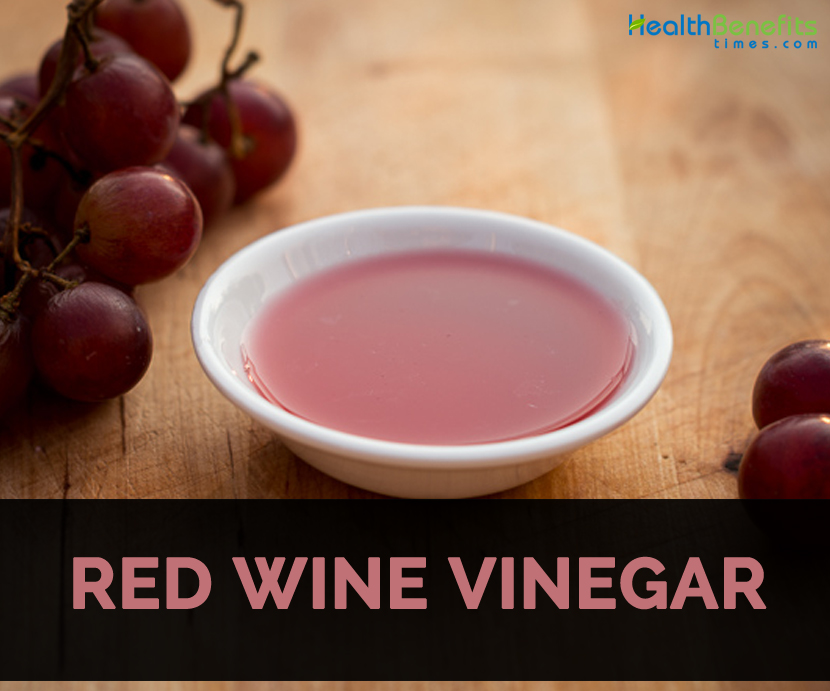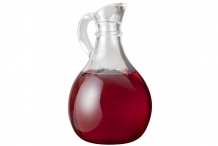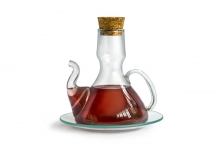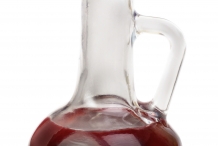How to make Red wine vinegar?
Ingredients and Supplies:
- 2 cups red wine (additionally 7 ½ cups more over next few weeks)
- 8-ounce jar of vinegar mother
- 1 cup of filtered water
- Small square cheesecloth
- 1-2 gallon earthenware crock or glass jar
Instructions:
- Mix two cups wine, the water and mother in a crock. With the use of two layers of cheesecloth, cover the crock and secure the cloth with a rubber band around the crock’s neck.
- Store it in a dark, warm place. A kitchen cabinet which is not frequently opened work well.
- Let the vinegar remain for a week. Then over the next week, add 2 ½ cups of wine to the vinegar on three different days. If thin, web-like veil has formed on the top of liquid, add wine by not disturbing it. Use a funnel or turkey baster to add wine slowly so that the bacteria is not disturbed.
- Leave the vinegar for two months. Taste it little while it ferments to see how the vinegar is doing. If the vinegar has aroma like nail polish, this means it has gone bad.
- When the vinegar is done, strain by using a coffee filter to eliminate any sediment and store it in a sterilized glass bottle.
Health Benefits of Red wine vinegar
Discussed below are the health benefits that could be achieved with the use of Red wine vinegar:
- Burn fat
Red wine vinegar has low content of fat and calories. Vinegar is known to enhance metabolism that helps to enhance the potential of burning fat. Red wine vinegar is made up of 5 percent acetic acid. Researchers have shown that genes responsible for fatty acid oxidation get activated with the ingestion of acetic acid.
- Prevent premature aging
Resveratrol is an antioxidant that is mostly discussed today in the medical world. Red wine vinegar has high content of antioxidants as it is obtained from the skin of grapes. Being a powerful antioxidant, it prevents oxidative stress and prevents the signs of aging such as blemishes, wrinkles and age spots.
- Suppress appetite
Research shows that the uses of red wine vinegar assist to affect hormonal release in the body by suppressing appetite. Use this vinegar as salad dressing who is trying to lose some weight.
- Helpful for diabetics
Diabetes is a condition which is featured by high blood glucose. Its symptoms are increased hunger, increased thirst, lethargy and frequent urination. Vinegar was used to manage diabetes before antidiabetes drugs were discovered. Red wine vinegar is included in diet that are prepared for diabetics. Various studies have shown positive relationship between red wine vinegar and release of glucose and insulin into bloodstream that is helpful for diabetic and also those who are highly prone for this condition.
- Supports digestion
Besides tenderizing meat, Red wine vinegar makes the food easier to digest and also stimulates release of gastric juices. It also normalizes digestive processes.
- Prevention of cancer
Resveratrol helps to slow or reverse the tumor growth.
- Absorption of calcium
This variety of vinegar access vital minerals to the body such as iron and also helps to improve the ability of the body to uptake calcium. It is vital for the development and maintenance of bone mineral density along with other functions of the body.
- Stronger bones and teeth
The scientific study has shown the goodness of Red wine vinegar on absorption of calcium within the body. The daily intake of red wine vinegar helps to increase the rate of absorbing calcium and also strengthens teeth and bones. With the increase in age, bones lose the strength in females. Thus red wine vinegar helps to keep calcium level in the intact.
- Healthy cholesterol
The high cholesterol level is related with various heart diseases such as angina, heart attack and heart failure. Red wine vinegar contains zero cholesterol and lowers the values of triglycerides and serum cholesterol. Due to the acetic acid content in vinegars, it is recognized to help in controlling as well as lowering triglyceride levels, cholesterol levels and blood pressure. It also minimizes the chances of heart diseases and keeps the blood flow smooth with the regular intake of vinegar. It also contains potassium that helps in reducing blood pressure. Those who consume oil and vinegar salad dressings have low chances of heart diseases.
- Prevent infection
Red wine vinegar has acetic acid which effectively counteracts bacterial infections. Moreover, it also cures the various infections such as acne, toenail fungus, ringworm with the regular intake of red wine vinegar. A couple of tablespoons help to keep the external and internal infections at bay.
- Good source of antioxidants
Free radicals produce oxidation and also harm body cells. Antioxidants found in our body and foods helps to prevent free radicals damage to the cells. Resveratrol, a powerful antioxidant is found in red wine vinegar. Research have shown that resveratrol counteract the harmful effects of diet rich in calories. It counteracts diseases such as high blood pressure, heart diseases, stroke, diabetes, mood disturbances, metabolic syndrome, cancer and inflammatory conditions.
Precautions
- As vinegar reacts with metals like iron, aluminum and copper so, use stainless steel or glass pots and utensils while cooking with red wine vinegar.
- Drinking too much Red wine vinegar increases the chances of tooth decay.
- Excessive intake of Red wine vinegar causes hypokalemia. The symptoms are muscle cramps, weakness and fatigue.
- When consumed in excess, it causes osteoporosis as it takes away the calcium.
- When red wine vinegar is used for prolonged time period, it causes hyperreninemia.
How to Eat
- It is predominant in Italian, French and Spanish cuisine.
- It is used for salad dressings.
- Mix red wine vinegar with oil (of your choice), pepper, salt and few seasonings.
- Drink it straight.
- Drizzled it on sliced fruit and ice cream.
- Soak fish, meats or vegetables to enhance flavor or to tenderize it.
- Add red wine vinegar to meringue for making it fluffier.
- Add it to dough to help the bread rise.
Other Facts
- The aged vinegar has delicate and sweet taste.
- Cheaper vinegar are more cheeky, raw and have aggressive flavor.
References:
https://www.marksdailyapple.com/how-to-make-red-wine-vinegar/
http://www.tandurust.com/health-faq-8/nutrients-in-red-wine-vinegar.html
https://www.nutritionadvance.com/red-wine-vinegar-benefits/
https://www.curejoy.com/content/uses-of-red-wine-vinegar/
https://medlicker.com/883-red-wine-vinegar
https://www.rd.com/health/diet-weight-loss/red-wine-vinegar-benefits/
https://www.doctorshealthpress.com/food-and-nutrition-articles/red-wine-vinegar-reality-check/
http://wine.healthfoodxdrinks.com/healing-powers-red-wine-vinegar-health/
https://www.organicfacts.net/red-wine-vinegar.html
Comments
| Red wine vinegar Quick Facts | |
|---|---|
| Name: | Red wine vinegar |
| Origin | Prevalent in the Mediterranean region. |
| Calories | 3 Kcal./cup |
| Major nutrients | Iron (0.88%) Manganese (0.30%) Magnesium (0.24%) Phosphorus (0.14%) Potassium (0.13%) |
| Health benefits | Burn fat, Prevent premature aging, Suppress appetite, Helpful for diabetics, Supports digestion |
| Name | Red wine vinegar |
|---|---|
| Native | Prevalent in the Mediterranean region. |
| Color | Pale pink to maroon |
| Taste | Flavorful, yet mellow, sharp |
| Major Nutritions | Iron, Fe 0.07 mg (0.88%) Manganese, Mn 0.007 mg (0.30%) Magnesium, Mg 1 mg (0.24%) Phosphorus, P 1 mg (0.14%) Potassium, K 6 mg (0.13%) Copper, Cu 0.001 mg 0.11%) Vitamin C (Ascorbic acid) 0.1 mg (0.11%) Calcium, Ca 1 mg (0.10%) Sodium, Na 1 mg (0.07%) Carbohydrate 0.04 g (0.03%) |
| Calories in 1 tbsp (14.9 g) | 3 Kcal. |









